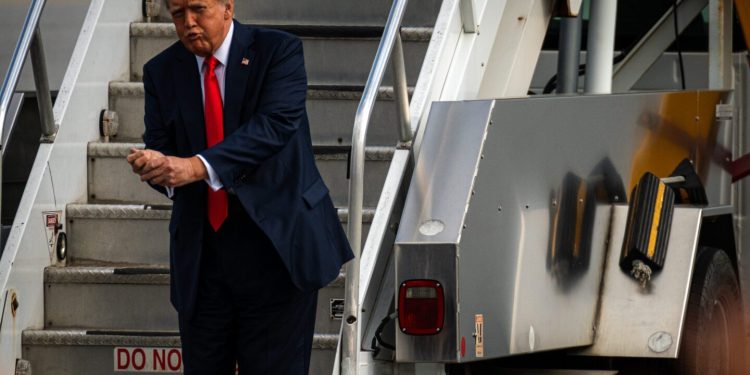JEFFERSON CITY, Mo. — As President-elect Donald Trump begins shaping his administration, Republican governors and lawmakers in several states are introducing proposals aimed at supporting his pledge to deport millions of individuals living in the U.S. illegally.
In a growing trend, lawmakers are proposing measures that grant local law enforcement the authority to arrest individuals who entered the U.S. illegally. These initiatives resemble recent Texas laws currently under judicial review for potentially overstepping federal authority.
Other proposed legislation for upcoming legislative sessions seeks to mandate that local law enforcement notify federal immigration authorities when individuals in the U.S. illegally are taken into custody, regardless of the nature of the charges. While not directly requested by Trump, these proposals align with his immigration policies.
“We would identify individuals violating this law and essentially deliver them to the nearest deportation port to ensure their removal in a safe, orderly manner,” said Missouri state Sen. Curtis Trent, who sponsors one such proposal.
The U.S. Department of Homeland Security estimates that as of 2022, approximately 11 million unauthorized immigrants reside in the country. During his campaign, Trump emphasized creating “the largest mass deportation program in history,” involving the National Guard and domestic police forces.
In contrast, Democratic-led states are actively resisting such efforts. For example, California convened a special legislative session to shield immigrants from potential Trump policies by enhancing legal aid for those facing deportation.
Tim Storey, CEO of the National Conference of State Legislatures, predicts that lawmakers across the nation will either resist or support Trump’s immigration agenda.
In Missouri, Trent’s proposed bill establishes a new state crime of “improper entry by an alien,” punishable by fines up to $100,000 and enforced deportation. Another proposal from Missouri state Sen.-elect David Gregory includes a $1,000 reward for informants reporting undocumented individuals and allows private bounty hunters to locate and detain them.
While Missouri’s Republican Gov.-elect Mike Kehoe has not endorsed specific proposals, he has expressed strong opposition to illegal immigration and fentanyl trafficking. “If they’re here illegally, it should definitely trigger action,” he stated.
Immigrant advocacy groups are raising concerns about such measures. Ashley DeAzevedo, president of American Families United, criticized Missouri’s proposed bounty system, warning it would foster chaos and division.
Public opinion on immigration enforcement remains divided. According to AP VoteCast, more than 4 in 10 voters support deporting most individuals living in the U.S. illegally, an increase from 3 in 10 in 2020.
Republican states often cite Texas as a model for immigration enforcement. Its $11 billion Operation Lone Star initiative has fortified the border with barriers, stationed troopers and National Guard members, and transported migrants to Democratic-led “sanctuary cities.” Texas officers have also made numerous arrests, including trespassing cases.
Tom Homan, Trump’s former “border czar,” recently praised Texas’ border security strategies as a potential blueprint for the Trump administration. Texas Gov. Greg Abbott confirmed ongoing coordination with Trump’s team.
Following Texas’ lead, Republican-led states like Iowa, Louisiana, and Oklahoma have enacted measures permitting local law enforcement to arrest undocumented individuals. In Oklahoma, Gov. Kevin Stitt announced plans to deport over 500 undocumented inmates from state prisons.
Arizona recently passed a measure allowing local police to detain migrants suspected of illegal entry. However, its implementation depends on similar laws remaining effective elsewhere for 60 consecutive days.
Other Republican initiatives aim to enhance local and federal cooperation on immigration enforcement. For instance, Utah Gov. Spencer Cox launched a program to improve coordination with federal authorities for deporting undocumented individuals involved in criminal activities, emphasizing “zero tolerance” for public safety threats.
Georgia enacted a law this year requiring jails to check inmates’ immigration status and assist federal immigration authorities. The measure gained traction after a high-profile murder case involving an undocumented Venezuelan man.
North Carolina’s Republican-controlled legislature recently overrode a veto to mandate sheriff compliance with federal immigration detainer requests, a response to urban counties refusing to cooperate with ICE.
Conversely, Democratic governors in Republican-led states are pushing back against sweeping deportation measures. Kansas Gov. Laura Kelly supports deporting undocumented individuals who commit crimes but opposes deploying the National Guard for federal immigration enforcement.
Wisconsin Gov. Tony Evers stressed the importance of undocumented immigrants in vital industries like agriculture and manufacturing. “Trying to move them out of the country is irrational,” Evers stated. “We’ll do whatever we can to avoid that.”
This report included contributions from Associated Press editors and writers across multiple states.
Also Read:
- The DOD sends an additional $988 million package to Ukraine
- Federal Judge Halts Rule Granting DACA Recipients Access to Affordable Care Act Coverage


